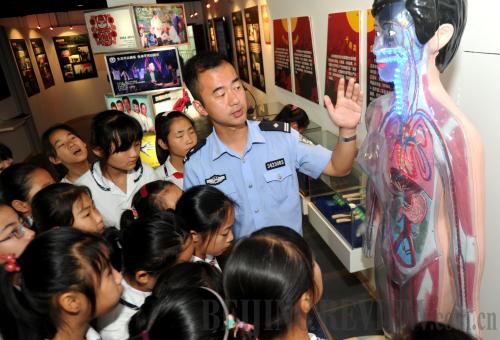|
 |
|
BODILY AWARENESS: A policeman explains the harm of drug use to primary school students in Hefei, Anhui Province on June 26, International Day Against Drug Abuse and Illicit Trafficking (LIU JUNXI) |
Homes for Pensions
China has begun to pilot its much-debated houses-for-pensions program in four cities as the country seeks alternative methods to cope with the rising needs of an aging population.
On July 1, Beijing, Shanghai, Guangzhou in Guangdong Province and Wuhan in Hubei Province launched a scheme that allows home owners over 60 to deed their houses to an insurance company or bank, which will then grant them a certain amount every month depending on the value of the houses and the person's life expectancy.
According to the China Insurance Regulatory Commission (CIRC), the pilot will last for two years.
CIRC official Yuan Xucheng said the pilot is intended to expand funding channels and improve the quality of the elderly care system.
The program, while hailed by some experts as an innovative solution, has sparked heated debate among the public, especially among those whose parents have property and fear losing their inheritance.
Latest official data show that the number of people aged above 60 has reached 202.43 million in China.
Anti-Terror Fight
The Chinese Government on June 24 released a television program about online terrorist propaganda created by the East Turkestan Islamic Movement (ETIM), which is listed by the UN Security Council as a terrorist group.
In 2013, Chinese police tracked down 109 pieces of terror-related audio and video content produced by the movement, compared with 32 in the previous year, according to the State Internet Information Office (SIIO). The recordings were matched by a surge in attacks.
Besides promoting terrorism, ETIM videos also offer tutorials on how to make explosives and how to use weapons.
The documentary indicates that the videos are produced outside China, with many hosted on servers in Turky.
The documentary's release followed the launch of a campaign on June 20 to rid the Internet of audio and video materials that promote terrorism or violence.
The move aims to safeguard social stability and long-term peace in northwest China's Xinjiang Uygur Autonomous Region, according to a statement from the SIIO.
The authorities will prevent terrorist materials produced overseas from being disseminated in China, remove such information online, punish website servers violating the rules and urge Internet companies to uphold their responsibilities, the statement said.
Xinjiang saw its bloodiest attack in five years on May 22 when 39 innocent people were killed in a terrorist attack in the regional capital of Urumqi. On April 30, three people were killed and 79 injured in an attack at a railway station in the city.
Super Computer
The Tianhe-2 supercomputer, developed by China's National University of Defense Technology, remains the world's most powerful computer, according to a biannual Top 500 list of supercomputers. This is the third time Tianhe-2 has topped the list.
Tianhe-2, which is Chinese for "Milky Way-2," clocks in at 33.86 petaflops, the equivalent of 33,860 trillion calculations per second. One hour of calculations by the machine would take the entire population of China 1,000 years if everyone was given a calculator.
The supercomputer is a product of China's 863 hi-tech program, which aims to reduce reliance on foreign technology. According to a statement from the Ministry of Science and Technology, Tianhe-2 has provided computing support for more than 120 clients at the National Supercomputer Center in Guangzhou in south China's Guangdong Province.
The development of the C919 airliner and drug testing in the Shanghai Institute of Materia Medica were both aided by Tianhe-2. The supercomputer also helped to support Guangzhou's e-government database and cloud computing storage.
| 